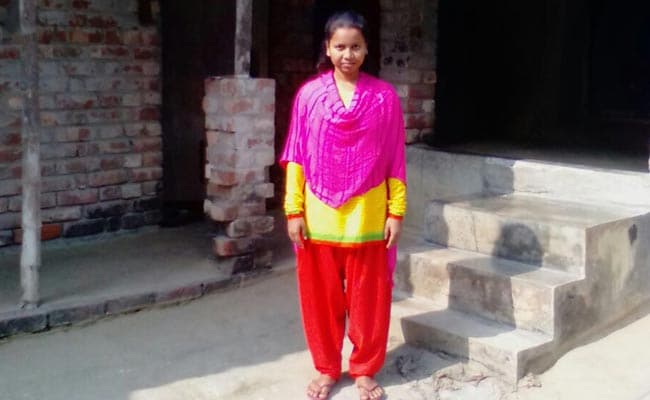- Home/
- After Losing Her Father At A Very Young Age, Laboni Shouldered The Responsibility Of Her Family
After Losing Her Father At A Very Young Age, Laboni Shouldered The Responsibility Of Her Family

Inclined towards sewing since childhood, Laboni's uncle helped her purchase a second hand sewing machine. Pursuing her hobby, Laboni started learning and practising sewing at home. And then she joined USHA Silai School programme in 2015.
Under USHA Silai School programme, Laboni not only honed her sewing skills, but also learned new techniques and styles. From learning about the basics of stitching garments like churidar, salwar, kurta, and patialato learning new stitching techniques and fashionable styles like different kind of blouses, hand stitching, Laboni learned it all from the professionals.
Determined to uplift her economic condition and provide a better life to her family, Laboni turned her hobby into her profession and opened her own sewing school in 2016. Since then she has trained 20 women and is currently training seven girls to stitch. Today, Laboni has a steady monthly income of Rs 5,000.
She was also shortlisted to be part of the team of 32 USHA Silai School women to work on the fashion label with professional fashion designers. This design label, launched at the Lakme Fashion Week 2018 will be sold at multiple outlets across the country.
Content in her new and improved life, Laboni plans to resume her studies andchase her dream of getting a government job. She believes this willhelp her support her family better than she currently does.
Related Stories
More- Team NDTV | Monday February 16, 2026
Odisha's Suchismita Sahu, Rajasthan's Preeti Prajapat, Manipur's Akhirun—Usha Silai School's Kushalta Ke Kadam celebrates these awardees, from homemakers to master trainers earning accolades
- Team NDTV | Thursday February 12, 2026
From Ladakh peaks to Assam fringes, Usha Silai School trains tribal women in Turtuk, Kargil & Dakhinkuchi—crafting livelihoods with armed forces, NHPC & NGOs. Stitching national resilience
- Team NDTV | Thursday January 29, 2026
From West Bengal's transgender tailors to Telangana's tribal seamstresses and Meghalaya's embroidery revivalists, Usha Silai School's Kushalta Ke Kadam partners with NIRDPR and state governments
- Team NDTV | Tuesday February 03, 2026
In Odisha's mining heartlands, Mahanadi Coalfields Limited teams with Usha Silai School's Kushalta Ke Kadam and Gram Utthan, empowering tribal women turning them into entrepreneurs
Adopt a Silai School
About the Initiative

Kushalta Ke Kadam, an initiative by USHA Silai School and NDTV has entered its eighth season. The aim is to empower more women across rural India by teaching them sewing skills and helping them open new doors of opportunities for themselves. The initiative encourages rural women to become financially independent and entrepreneurs by taking up sewing and training others in their respective communities.
Since 2011, the USHA Silai School initiative has trained more than 12 lakh rural women through over 33,000 Silai schools, spanning over 20,751 villages across India.
The women earn Rs. 4,000 – 5,000 per month on an average, with the highest recorded monthly earning being Rs. 84,000 in a month. This earning works as a catalyst towards building their self-confidence, reducing gender inequities, and raising their stature within their families and in society at large.
In Pics

Rebari girls grow up learning traditional embroidery, which along with their new found sewing skills developed at Usha Silai Schools, is helping them earn a living.

Usha Silai School has empowered many rural women to support their family and send their children to school.

The Usha Silai School, established in a small nondescript village that goes by the name of Kottai, is helping empower people from varied communities.

The all-inclusive Usha Silai School Programme covers the entire nation from hamlets tucked between hills to villages cast by the sea.

Vegetables farmers from the Mizoram hills earn very little given the topography of the area. Usha Silai Schools have played an important part in this region by skilling women to financially contribute towards their households.

Usha Silai School learner Lucy has trained seven other women in her community, helping them to become financially independent.

Women like Kaviben from the nomadic Rebari community are finally laying down their roots as they begin to gain financial independence and thereby stability through Usha Silai School.

Usha Silai School, located in the Gujarat's Bhuj village, is enabling rural women to earn as much as Rs. 2,500-4,000 each month.

Usha Silai School, in association with a Gujarat based NGO called Kala Raksha, is trying to bring about a Silai revolution in Bhuj.

Besides training other women from their community, many Usha Silai School learners have become entrepreneurs in their own right.

With sewing becoming easily accessible and lucrative, the silai schools are also helping revive traditional motifs and designs.






